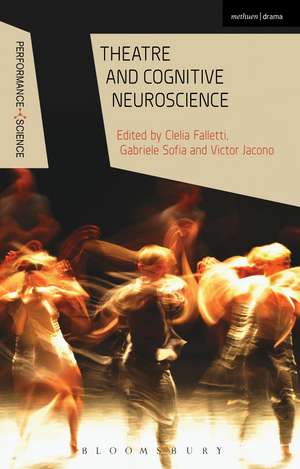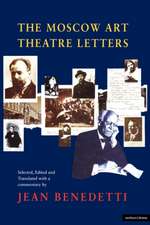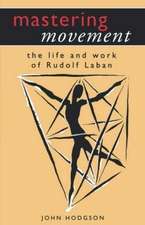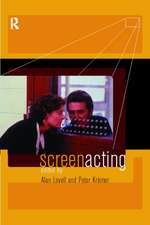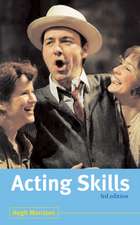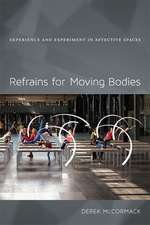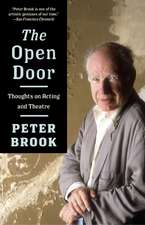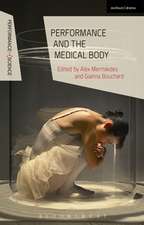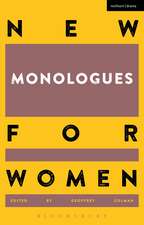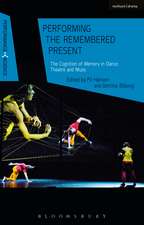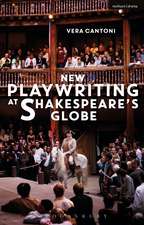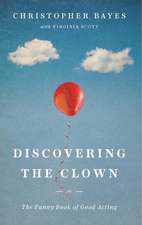Theatre and Cognitive Neuroscience: Performance and Science: Interdisciplinary Dialogues
Editat de Clelia Falletti, Gabriele Sofia, Victor Jacono Professor John Lutterbie, Prof Nicola Shaughnessyen Limba Engleză Hardback – 24 feb 2016
Preț: 714.19 lei
Preț vechi: 914.41 lei
-22% Nou
Puncte Express: 1071
Preț estimativ în valută:
136.66€ • 142.68$ • 113.10£
136.66€ • 142.68$ • 113.10£
Carte tipărită la comandă
Livrare economică 04-18 aprilie
Preluare comenzi: 021 569.72.76
Specificații
ISBN-13: 9781472584786
ISBN-10: 1472584783
Pagini: 280
Ilustrații: 10 bw illus
Dimensiuni: 138 x 216 x 25 mm
Greutate: 0.46 kg
Editura: Bloomsbury Publishing
Colecția Methuen Drama
Seria Performance and Science: Interdisciplinary Dialogues
Locul publicării:London, United Kingdom
ISBN-10: 1472584783
Pagini: 280
Ilustrații: 10 bw illus
Dimensiuni: 138 x 216 x 25 mm
Greutate: 0.46 kg
Editura: Bloomsbury Publishing
Colecția Methuen Drama
Seria Performance and Science: Interdisciplinary Dialogues
Locul publicării:London, United Kingdom
Caracteristici
Draws on research presented at the annual international conference 'Dialogues between Theatre and Neuroscience' between 2009 and 2013, hosted by the Department of Art and Performance at Sapienza University of Rome
Notă biografică
Clelia Falletti is Associate Professor at Sapienza University of Rome, Italy. Since 1981 she has participated in research by ISTA (International School of Theatre Anthropology) directed by Eugenio Barba; she is dramaturg for Teatro Potlach, and co-editor of theatre books series with two Italian publishing houses.Gabriele Sofia teaches theatre studies and physical theatre at Paul Valéry University, Montpellier, France. Since 2006 he has carried out an interdisciplinary research project on the neurophysiology of the actor and the spectator between the Sapienza University of Rome and the Maisons des Sciences de l'Homme Paris Nord. From 2009 to 2013 he promoted and organized five editions of the International Conference "Dialogues between Theatre and Neuroscience" at Sapienza.Victor Jacono, PhD in Performance Studies, teaches at the MCAST Institute for the Creative Arts and Drama at the Alternative Learning Program, Malta.
Cuprins
PrefacePart One: Theatre as a space of relationships: a neurocognitive approach1. Editorial Introduction: The space of shared action (Clelia Falletti, Sapienza University of Rome, Italy)2. "Mirror mechanism" and motor behavior (Maria Alessandra Umiltà, neuroscientist, University of Parma, Italy)3. Body presence and extra-personal space perception (Giorgia Committeri and Chiara Fini neuroscientists, University of Chieti, Italy)4. The actor at the circus. Towards a cognitive approach (Philippe Goudard, University Paul Valéry Montpellier 3, France)Part Two: The spectator's performative experience and "Embodied theatrology"5. Editorial introduction: Towards an "Embodied Theatrology"? (Gabriele Sofia, University Paul Valéry Montpellier 3, France)6. Body and corporeality. A small multidisciplinary glossary (Marco De Marinis, University of Bologna, Italy)7. Audiences' experience of proximity and co-presence in live dance performance (Corinne Jola, neuroscientist and choreographer, Abertay University, Dundee and Matthew Reason, Faculty of Arts, York St John University, UK)8. "Theatre and science". Some reflections on the theatre effectiveness mechanism in Antonin Artaud (Lorraine Dumenil, University Paris 3 Sorbonne Nouvelle, France)Part Three: The complexity of theatre and human cognition9. Editorial Introduction: The Complexity of the actor's pedagogy and human cognition (Victor Jacono, Sapienza University of Rome, Italy)10. A rope over an abyss (John J. Schranz, University of Malta)11. The actor's embodied language. Preliminary indications from a pilot experiment (Gabriele Sofia; Silvia Spadacenta, neuroscientist, University of Tu¨bingen, Germany; Clelia Falletti; Giovanni Mirabella, neuroscientist, Sapienza University of Rome, Italy)12. Perception and the organization of time in the theatre (Luciano Mariti, Sapienza University of Rome, Italy)Part Four: Interdisciplinary perspectives in applied performance13. Editorial introduction: Does art therapy work as a rehabilitative tool? (Giovanni Mirabella neuroscientist, Sapienza University of Rome, Italy)14. Use of theatrical techniques and elements as interventions for autism spectrum disorders (Jenna Gabriel, Harvard University, USA; Elisa Angevin, Columbia University, USA; Tamara Rosen and Matthew D. Lerner, Stony Brook University, USA)15. Theatre is a valuable tool for parkinson's disease rehabilitation (Nicola Modugno, neurologist, IRCCS, Neuromed, Pozzilli; Imogen Kusch, theatre director of the Klesidra Company, Rome and Giovanni Mirabella)16. Theatre and therapy: care, cure or illusion? (Jean-Marie Pradier, Ethnoscenologist, University Paris 8 - MSH-Paris Nord, France)AfterwordEndnotesIndex
Recenzii
A key strength of the book lies in the diversity of its perspectives ... The book makes a significant contribution to this field of study, particularly since there is arguably a lacuna when it comes to the featuring of theatre ... in scientific publications ... Its speciality is its multifaceted perspective.
The essays provide a range of information, applications, and insights from the intersections of science and performance.
The essays provide a range of information, applications, and insights from the intersections of science and performance.
